Parliament rejects tougher gun laws
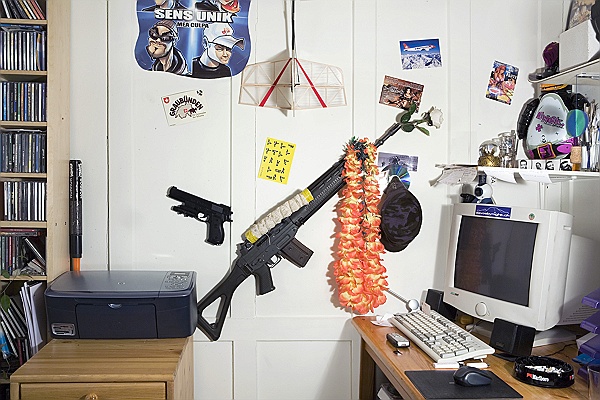
The House of Representatives, like the cabinet, is urging Swiss voters to reject a people’s initiative that aims to ban military weapons from households.
The initiative will now go to the Senate, ahead of a national vote in February 2011. New figures show that Switzerland’s militia soldiers seem to prefer to keep their military guns at home rather than deposit them free at local army bases.
Launched in February 2009 by the centre-left Social Democratic Party and a number of pacifist organisations, the people’s initiative calls for army weapons to remain in barracks and for a national gun register to be created. It also wants to ban private individuals from buying or owning particularly dangerous guns such as automatic weapons and pump-action shotguns.
According to the initiative’s committee, around 2.5 million weapons are in circulation in Switzerland, of which 1.7 million are current or old army-issue rifles and pistols.
They claim army weapons are responsible for around 300 deaths a year and having access to a gun makes fatal incidents easier, especially gun suicides.
But after a lengthy, heated debate, on Friday the House of Representatives – led by centre-right and rightwing parties – voted to reject the proposal, arguing current laws were already very strict.
“The problem is not the weapon but the human being who decides to kill themselves,” said Thomas Hurter from the rightwing Swiss People’s Party, adding that anyone who wanted to commit suicide would in any case find another method.
Critics of the initiative said that it played on people’s emotions and took aim at the principle of the Swiss militia army and shooting clubs.
They added that making it compulsory to deposit army guns in arsenals would also complicate obligatory shooting practice sessions for militia soldiers.
Arsenal not bedroom
Keeping military firearms at home is a long-standing tradition for the Swiss militia army, which is supposed to be ready for a call to arms in times of crisis.
But it’s wrong to believe that “today the Russians may cross the River Rhine in the middle of the night and the Swiss soldiers will have to defend themselves from their homes using their guns,” replied Tiana Moser from the Liberal Green Party.
“A gun’s place is in an arsenal, not in the bedroom,” added Chantal Galladé from the centre-left Social Democratic Party.
Some experts agree. “The availability of weapons is a risk in terms of threats which may be carried out,” court psychiatrist Josef Sachs told swissinfo.ch.
Threats are more commonly acted upon at home, spontaneously, he added: “Someone’s own military-issue weapon or their father’s may be used.”
Limited drop-offs
The parliamentary debate is the latest in a series of discussions over gun law issues in the past few years in Switzerland.
The cabinet rejected the new initiative in December 2009, arguing that current legislation on weapons offered enough protection against abuse.
It says adequate prevention measures have been put in place, including the option for soldiers to store their weapons free of charge at a local army base as from January 1, 2010.
But the idea does not seem very popular. Until the end of May 2010, only 551 weapons had been handed in to cantonal arsenals, of which 273 in Geneva, which introduced the measure in 2008.
Elsewhere, there is very limited interest: 50 guns each were stored in cantons Zurich and Bern, with only two per canton from Jura, Schaffhausen and Lucerne. In cantons Valais and Uri none were deposited.
Tighter regulations
Providing free arsenals is just one of a series of recent tighter national measures. Soldiers who wish to keep their gun after completing their compulsory army service will now have to present a weapons acquisition permit.
The government has also called for earlier detection of soldiers who represent a potential threat.
And most active soldiers are not allowed to keep munitions at home, since a ban on the practice was agreed by parliament in December 2008. Ammunition is now mainly stored in central arsenals.
To justify its opposition to a national gun register, the government says every new purchase is now registered with a cantonal arms office. Gun permits are issued for authorised weapons, while hunting and sports rifles only have to be announced.
The Swiss Shooting Sports Association, representing 250,000 members, has described the new initiative as “excessively restrictive” and “patronising” for soldiers.
This issue has been a political hot potato in Switzerland after a number of tragedies involving army weapons.
These have included the 2001 killings of 14 people in the cantonal parliament of Zug and the murder of Swiss ex-skier Corinne Rey-Bellet by her husband in April 2006. Suicides with army guns are also a relatively frequent occurrence.
Simon Bradley, swissinfo.ch (With input from Sandra Grizelj)
The people’s initiative against gun violence, signed by 106,067 people, was launched on February 23, 2009.
The government rejected the proposal on December 16, 2009. It will be discussed in the House of Representatives on June 17 and in the Senate during the autumn session. It could go to a national vote in February 2011.
Launched in February by 75 organisations, including the centre-left Social Democratic Party, the Green Party and a number of pacifist organisations, the initiative calls for army weapons to remain in barracks and for a national gun register to be created. It also wants to ban private individuals from buying or owning particularly dangerous guns such as automatic weapons and pump-action shotguns.
All able-bodied men aged 20-30 are conscripted for around three months and are issued with a rifle.
After initial training they are required to do up to four weeks of army service a year until they have served 260 days or reached the age of 34.
During the Cold War, the Swiss Army numbered 600,000 men who could be called up at short notice. In 1995 the army was reduced to 400,000 and today it is about 200,000, including 80,000 reserve troops.
Military service is optional for women and Swiss living abroad.
Estimations of the number of firearms in circulation in Switzerland range upwards from 1.2 million. The anti-gun initiative committee puts the figure at 2.5 million.
Army-issue weapons are said to be involved in the deaths of more than 300 people in Switzerland every year.
According to Ipsilon Suicide Prevention, 34% of suicides among men are due to firearms, compared with only 3.7% of suicides among women.
Swiss gun laws are among the most liberal worldwide. Most army weapons are stored at home, but since the beginning of 2010, they can be kept in cantonal arsenals (2008 for canton Geneva).

In compliance with the JTI standards
More: SWI swissinfo.ch certified by the Journalism Trust Initiative

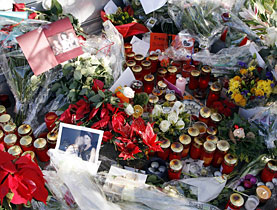
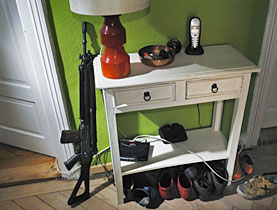
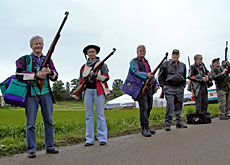
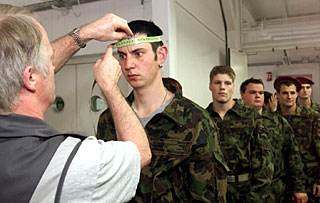
You can find an overview of ongoing debates with our journalists here. Please join us!
If you want to start a conversation about a topic raised in this article or want to report factual errors, email us at english@swissinfo.ch.